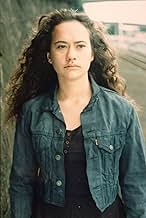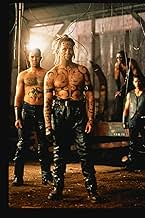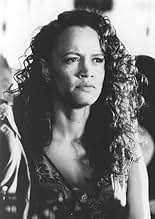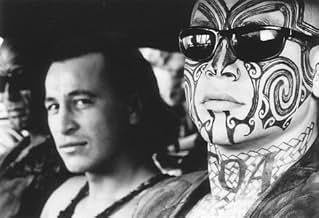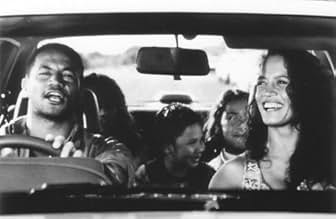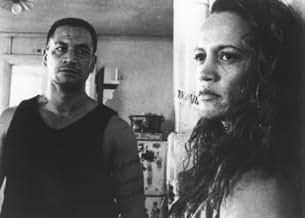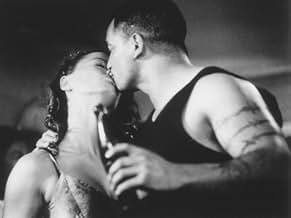IMDb-BEWERTUNG
7,9/10
38.451
IHRE BEWERTUNG
Eine Familie, die von Maori-Kriegern abstammt, wird von einem gewalttätigen Vater und den gesellschaftlichen Problemen, als Ausgestoßene behandelt zu werden, heimgesucht.Eine Familie, die von Maori-Kriegern abstammt, wird von einem gewalttätigen Vater und den gesellschaftlichen Problemen, als Ausgestoßene behandelt zu werden, heimgesucht.Eine Familie, die von Maori-Kriegern abstammt, wird von einem gewalttätigen Vater und den gesellschaftlichen Problemen, als Ausgestoßene behandelt zu werden, heimgesucht.
- Regie
- Drehbuch
- Hauptbesetzung
- Auszeichnungen
- 22 Gewinne & 7 Nominierungen insgesamt
Empfohlene Bewertungen
This is a film that should be seen by everyone. A powerful movie that will stir almost every emotion you can think of, and sometimes all at once. Completely believable and compelling film that will hold you till the very end, and a long time after.
10Emunah
I'm too speechless to say anything at length. The movie was... gut wrenching. I don't know if I can even recommend this film to people, because I'm seriously afraid it will give people nightmares for days on end. "Once Were Warriors" is a tough as nails, stomach churning, psychologically scarring and disturbing film about people and things that most are not even aware of exists. The whole cast should be commended for their incredible and brave performances. The person who deserves the most credit is Rena Owen who plays the female lead. Her performance blew me to pieces... she was absolutely superb. I've seen a lot of movies in my life, but never... never anything like this.
There are films where you can see extensive carnage and it doesn't move you. This is a film where you see a man hit his wife and it hits you in the gut like you're being hit yourself. An excellent depiction of the impact of anger and violence on the members of a poor family. In this case, they happen to be Maoris living in New Zealand. The father dominates the family because he is so powerless in the other facets of his life. He's addicted to boozing and carousing and the only way he can really express himself is with his fists. The wife fights back, but can be beaten into submission. But she's also allowed herself to be seduced by the boozy lifestyle and fears responsibility. The center of the family is the oldest daughter (13), who is really the only one who can communicate with all the other members. The boys are either lost in life or lost in their own rage. The youngest daughter is simply too small and clings to her sister. It takes a tragedy to allow some of these individuals to reach out for each other and try to re-create a form of family life. A very powerful film, not for the faint of heart.
I don't know where to start. When I'm asked of my favorite movie ever, this is ALWAYS the first to come to mind. This is one of the finest movies I've ever seen, and I've seen too many to count.
Once Were Warriors is, at its most stripped, about a woman named Beth and her struggle to just do what's best for her family. She is of Maori heritage, New Zealand's sort of Native Americans. Culture is a proud and powerful aspect of the movie, as Beth's strengths lie in her devotion to her family and her heritage. But that is little comfort, as her daughter is struggling to accept adulthood, her youngest son is heading towards juvenile detention, and her oldest son is fast on his way to joining a brutal gang. Worst of all, her husband Jake is a heavy drinker.
The film excels at painting everybody in full 3 dimensions. Each of her kids are troubled, but they all have fierce love and respect for their mother. The gang is cruel to the oldest son, but at the same time embraces him. The juvenile detention center separates the youngest son from his only home, but instills in him a pride in his ancestry. And Jake himself is a beast, a man built like a tank who will destroy you with anything available should you spill his beer...but somehow he also comes across as loving Beth. Sometimes.
The film follows Beth as she does her best to hold the family together even while the various problems tear them apart. At the center is Jake's drinking and further carelessness of his family's dissipation. While Beth's answer is to nurture and aid her children, Jake insists it's best to drink away the problems and quit being so "soft" on the kids. And we watch, through it all, as the family spirals further apart. Near the end, after seeing both happy and horrible things happen to each of the characters, we are jarred by a terrible tragedy. Beth and Jake both deal with it uniquely, as she draws once again on the tremendous power of family and human spirit, while Jake deals with it his own way. The last 15 minutes of the film keep us in suspense as we wonder whether a certain horrible injustice will be confronted, and if so, how. This scenario involves and encapsulates everyone in the family, and who they are inside.
The last few moments of the movie made me want to jump to my feet and applaud. I won't reveal what happens, but in the last 5 minutes, every person shows so much inner strength that I glow with admiration for their actions. Especially those of Beth and her oldest son, whose interaction with Jake results in my favorite scene in the movie. But don't think you know what's going to happen based on this description -it's a complicated scenario. I felt satisfied with the conclusion on all fronts, and thought that each character showed exactly where their strength lies.
Be forewarned that this movie is very heartbreaking. Its overall tone is one of futility, of better lives not received, of wanting the best but never quite getting it. It is very raw and intense in its portrayal of physical and domestic violence, and the easily upset may have a hard time waiting to see if it ends happily enough for their tastes. But no matter what your opinion is, it will definitely be a film that stays with you for a long, long time. My highest recommendation.
Once Were Warriors is, at its most stripped, about a woman named Beth and her struggle to just do what's best for her family. She is of Maori heritage, New Zealand's sort of Native Americans. Culture is a proud and powerful aspect of the movie, as Beth's strengths lie in her devotion to her family and her heritage. But that is little comfort, as her daughter is struggling to accept adulthood, her youngest son is heading towards juvenile detention, and her oldest son is fast on his way to joining a brutal gang. Worst of all, her husband Jake is a heavy drinker.
The film excels at painting everybody in full 3 dimensions. Each of her kids are troubled, but they all have fierce love and respect for their mother. The gang is cruel to the oldest son, but at the same time embraces him. The juvenile detention center separates the youngest son from his only home, but instills in him a pride in his ancestry. And Jake himself is a beast, a man built like a tank who will destroy you with anything available should you spill his beer...but somehow he also comes across as loving Beth. Sometimes.
The film follows Beth as she does her best to hold the family together even while the various problems tear them apart. At the center is Jake's drinking and further carelessness of his family's dissipation. While Beth's answer is to nurture and aid her children, Jake insists it's best to drink away the problems and quit being so "soft" on the kids. And we watch, through it all, as the family spirals further apart. Near the end, after seeing both happy and horrible things happen to each of the characters, we are jarred by a terrible tragedy. Beth and Jake both deal with it uniquely, as she draws once again on the tremendous power of family and human spirit, while Jake deals with it his own way. The last 15 minutes of the film keep us in suspense as we wonder whether a certain horrible injustice will be confronted, and if so, how. This scenario involves and encapsulates everyone in the family, and who they are inside.
The last few moments of the movie made me want to jump to my feet and applaud. I won't reveal what happens, but in the last 5 minutes, every person shows so much inner strength that I glow with admiration for their actions. Especially those of Beth and her oldest son, whose interaction with Jake results in my favorite scene in the movie. But don't think you know what's going to happen based on this description -it's a complicated scenario. I felt satisfied with the conclusion on all fronts, and thought that each character showed exactly where their strength lies.
Be forewarned that this movie is very heartbreaking. Its overall tone is one of futility, of better lives not received, of wanting the best but never quite getting it. It is very raw and intense in its portrayal of physical and domestic violence, and the easily upset may have a hard time waiting to see if it ends happily enough for their tastes. But no matter what your opinion is, it will definitely be a film that stays with you for a long, long time. My highest recommendation.
10kiwibeca
I've been reading the comments that people have made on this brilliant piece of film making that makes me proud to be a kiwi. Although I'm not Maori, I have somewhat of an understanding of, and a very deep appreciation for Maori culture. It is after all a major contributor to the uniqueness of New Zealand, and it's what a lot of the tourists come here to see/experience.
Some people have commented that the character of Beth is "descended from Maori royalty" and that the character of Jake is "descended from slaves". That's not quite correct. Although there is a Maori monarch; (Dame Te Atairangikaahu, the current Maori queen lives at the Turangawaewae Marae in Ngaruawahia, her official residence.) the Maori monarchy only goes back to the 19th century, and its not really representative of all Maori as it only really affects Waikato iwi/hapu, (tribe/sub tribe) It is more likely that Beth would be descended from chiefly linage, and hence she and her whanau, (extended family) would be very much aware of and in tune with their whakapapa or ancestry. Beth's line near the end of the movie that her people "once were warriors" is an indicator of this.
(The facial and body tattoos, or Moko that one sometimes sees Maori wearing are in fact representative of their whakapapa. Also, the carvings that feature on Marae and other carved Maori buildings/gates etc are representative of tribal ancestors, much like Indian Totem poles.)
Jake on the other hand is obviously urbanized. He would most probably know little or nothing about his whakapapa, and in addition he probably would not even be able to identify with an iwi or hapu. This would explain why he makes several references to "Maori bulls***". He is disenfranchised from his culture, and probably doesn't even speak Maori that well. (Although Temurera Morrison himself speaks fluent Maori.) His family have obviously been living in Auckland for so long, and there has been such tribal intermingling, that he doesn't know whether he's Arthur or Martha. And what's more, he doesn't care either.
(For those of you who are interested, the motorway shown at the start of the movie is the Southern Motorway which runs right through South Auckland, which is where *a lot* of Maoris and Pacific Islanders live.)
As other people have said, this kind of thing is sadly not unique to Maori, as American/Canadian Indians and Australian Aborigines can testify. Likewise domestic violence itself is not only limited to minority ethnic groups.
This is easily one of the best movies that I have ever seen. So if you haven't had the privilege of seeing it yet, then I highly recommend that you do so. George Henare's stirring Taiaha scene alone is well worth the cost of getting the movie out.
(A Taiaha is a Maori spear. To use one of these, one must have immense mana, or importance. As Henare's character said, the British *feared* the highly skilled Taiaha warriors.)
Some people have commented that the character of Beth is "descended from Maori royalty" and that the character of Jake is "descended from slaves". That's not quite correct. Although there is a Maori monarch; (Dame Te Atairangikaahu, the current Maori queen lives at the Turangawaewae Marae in Ngaruawahia, her official residence.) the Maori monarchy only goes back to the 19th century, and its not really representative of all Maori as it only really affects Waikato iwi/hapu, (tribe/sub tribe) It is more likely that Beth would be descended from chiefly linage, and hence she and her whanau, (extended family) would be very much aware of and in tune with their whakapapa or ancestry. Beth's line near the end of the movie that her people "once were warriors" is an indicator of this.
(The facial and body tattoos, or Moko that one sometimes sees Maori wearing are in fact representative of their whakapapa. Also, the carvings that feature on Marae and other carved Maori buildings/gates etc are representative of tribal ancestors, much like Indian Totem poles.)
Jake on the other hand is obviously urbanized. He would most probably know little or nothing about his whakapapa, and in addition he probably would not even be able to identify with an iwi or hapu. This would explain why he makes several references to "Maori bulls***". He is disenfranchised from his culture, and probably doesn't even speak Maori that well. (Although Temurera Morrison himself speaks fluent Maori.) His family have obviously been living in Auckland for so long, and there has been such tribal intermingling, that he doesn't know whether he's Arthur or Martha. And what's more, he doesn't care either.
(For those of you who are interested, the motorway shown at the start of the movie is the Southern Motorway which runs right through South Auckland, which is where *a lot* of Maoris and Pacific Islanders live.)
As other people have said, this kind of thing is sadly not unique to Maori, as American/Canadian Indians and Australian Aborigines can testify. Likewise domestic violence itself is not only limited to minority ethnic groups.
This is easily one of the best movies that I have ever seen. So if you haven't had the privilege of seeing it yet, then I highly recommend that you do so. George Henare's stirring Taiaha scene alone is well worth the cost of getting the movie out.
(A Taiaha is a Maori spear. To use one of these, one must have immense mana, or importance. As Henare's character said, the British *feared* the highly skilled Taiaha warriors.)
Wusstest du schon
- WissenswertesTemuera Morrison would get challenged to fight all the time by local thugs after seeing him play Jake Heke.
- PatzerWhen Beth is being beaten by Jake at the start of the film she is thrown into a mirror which shatters completely. Later when the children are cleaning up the mess the mirror is back on the wall with only a few cracks.
- Crazy CreditsMost of the opening credits are either split in half, scattered in different areas of the screen, abnormally shaped or used in small white print. Some are even mixed.
- SoundtracksOnce Were Warriors (The Awakening)
Performed by Tama Renata
Top-Auswahl
Melde dich zum Bewerten an und greife auf die Watchlist für personalisierte Empfehlungen zu.
- How long is Once Were Warriors?Powered by Alexa
Details
- Erscheinungsdatum
- Herkunftsland
- Offizieller Standort
- Sprachen
- Auch bekannt als
- Somos guerreros
- Drehorte
- Produktionsfirmen
- Weitere beteiligte Unternehmen bei IMDbPro anzeigen
Box Office
- Bruttoertrag in den USA und Kanada
- 1.608.570 $
- Weltweiter Bruttoertrag
- 1.608.610 $
Zu dieser Seite beitragen
Bearbeitung vorschlagen oder fehlenden Inhalt hinzufügen



